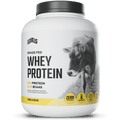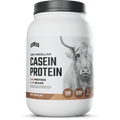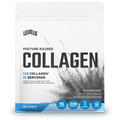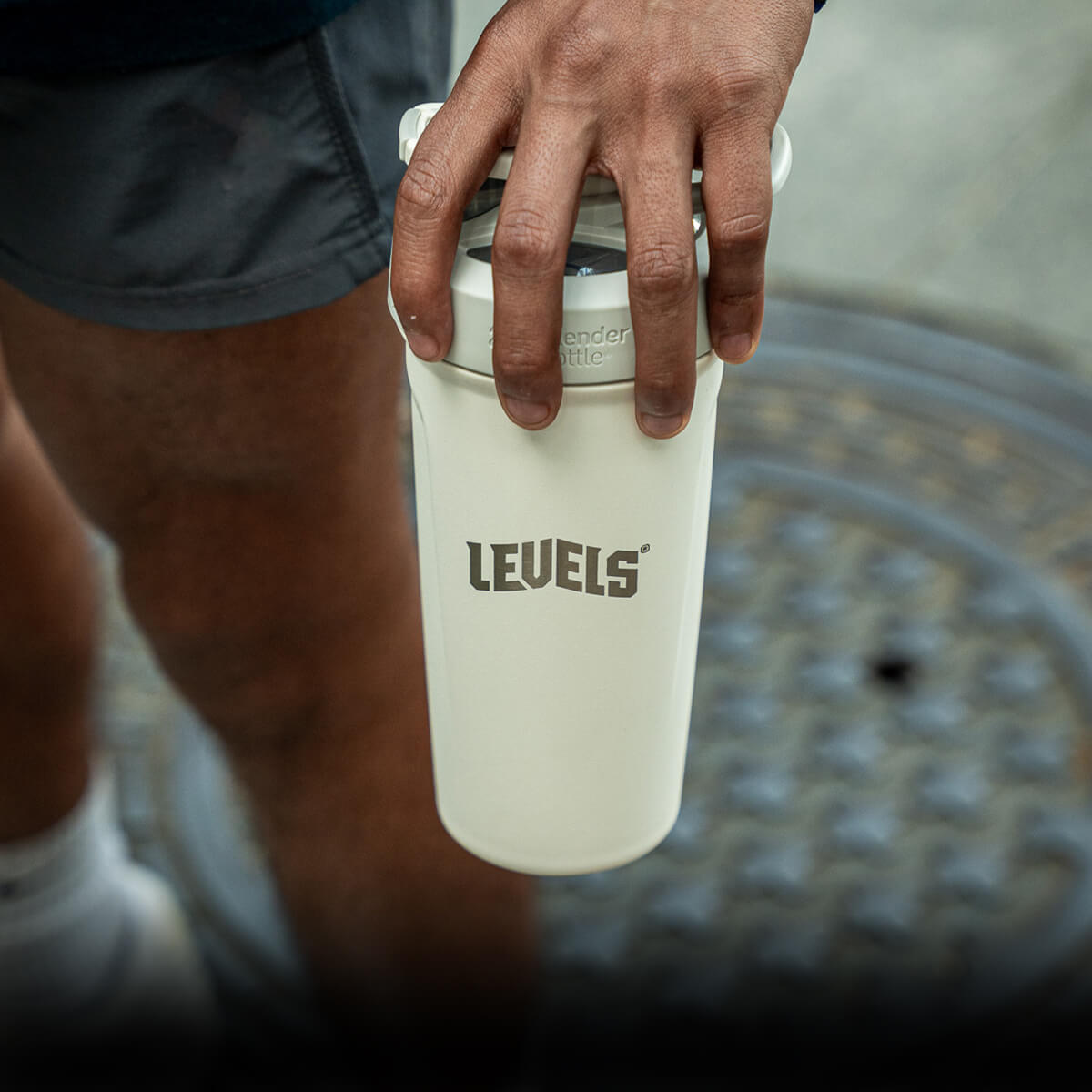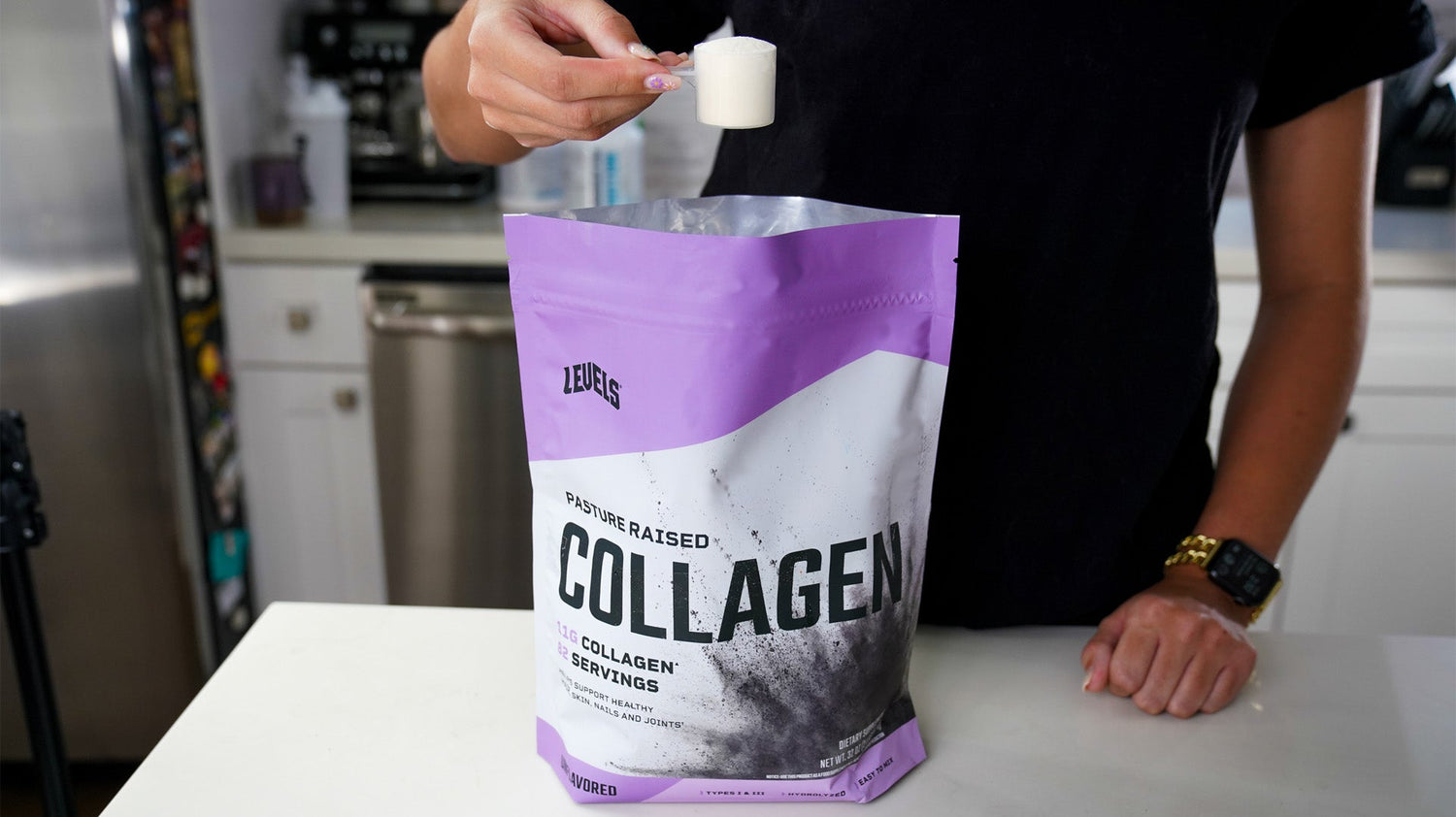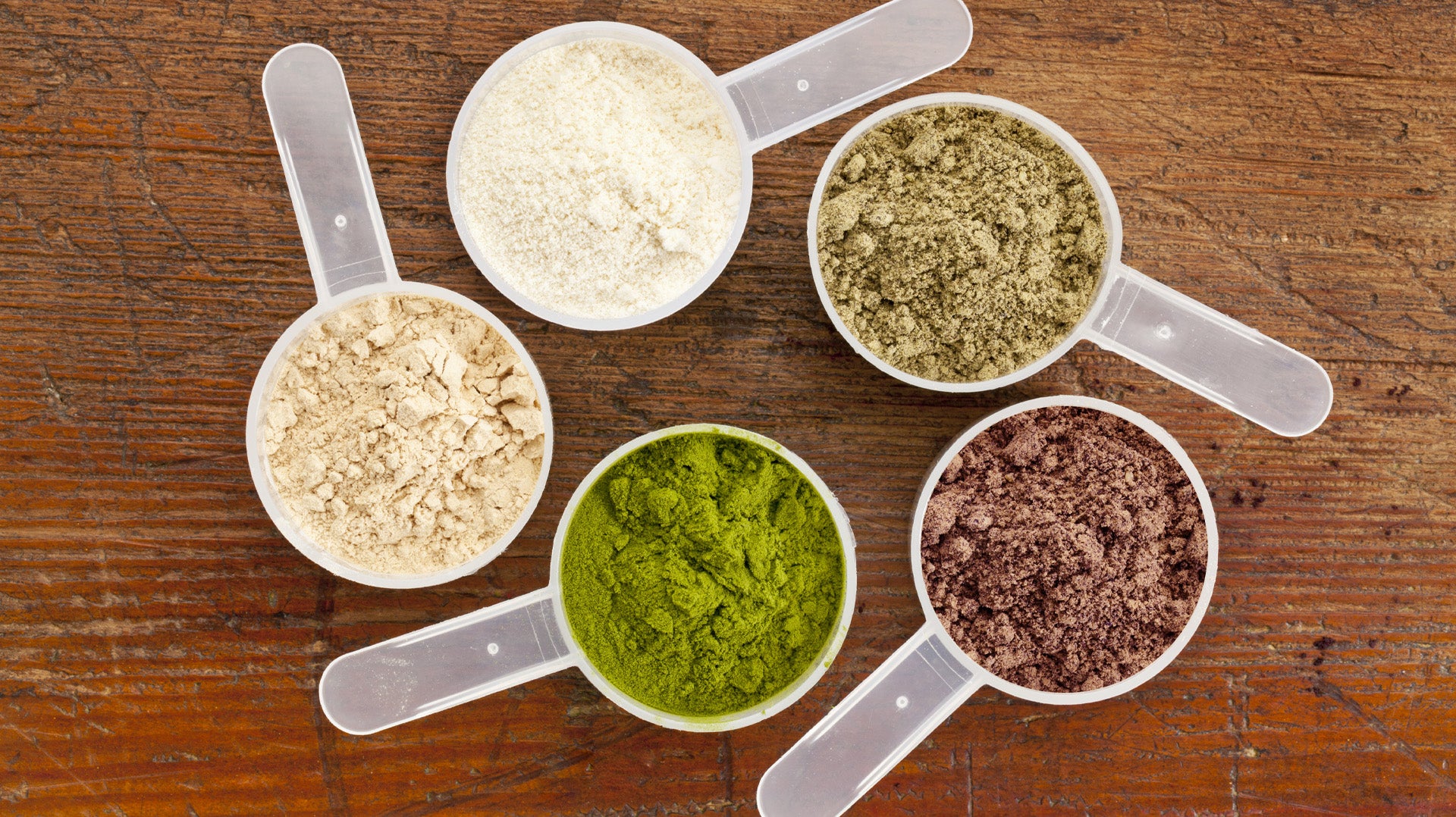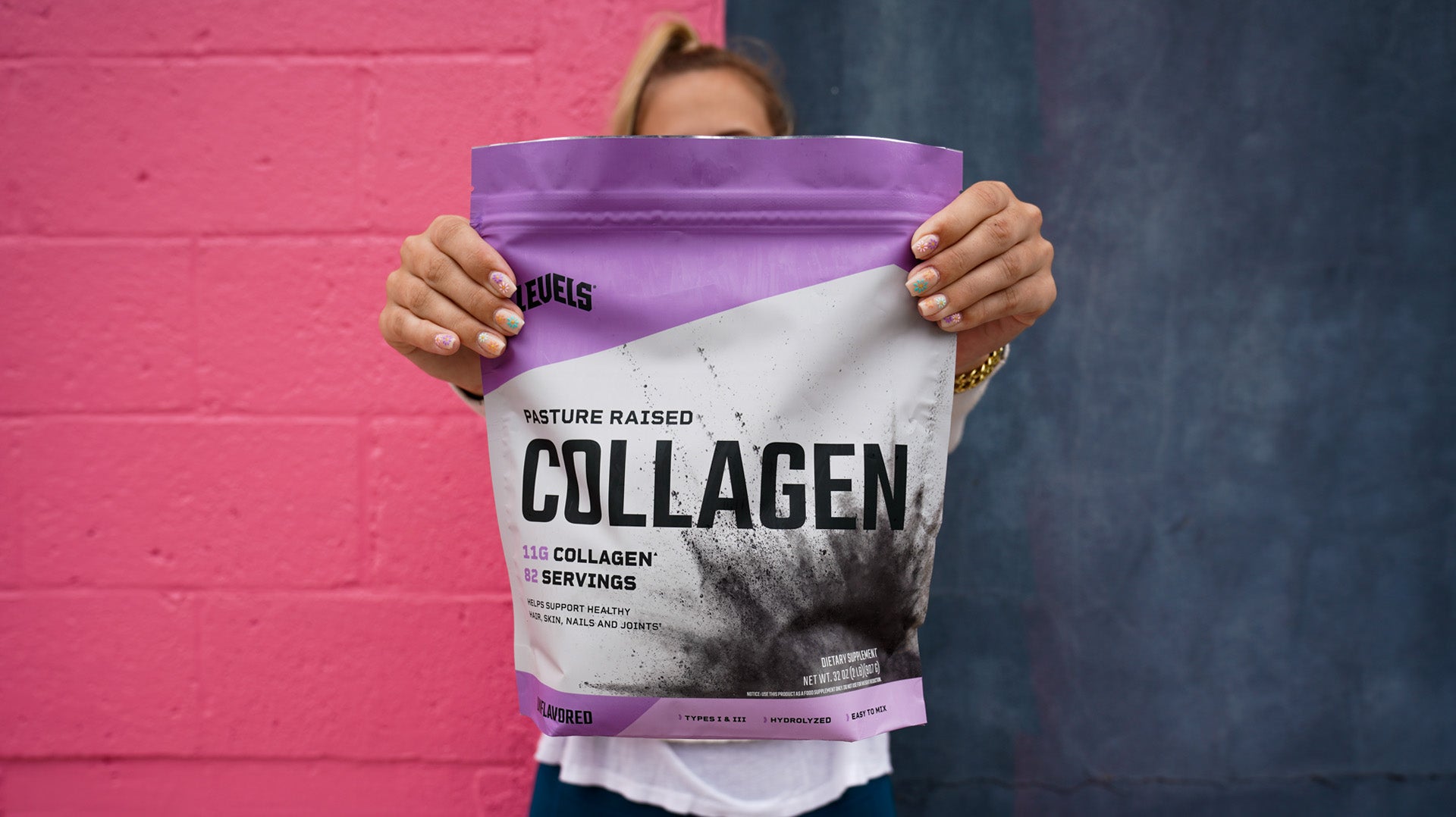Hydrolyzed collagen is a protein supplement that supports faster injury recovery, stronger joints, smoother skin, and better sleep.
But if you don’t get your dosage right, you may not achieve the full benefits of collagen peptides. And taking too much could result in amino acid deficiencies and other problems best avoided.
In this article, we dive into cutting-edge research to bring you the best, most effective collagen dosages used in studies.
You’ll also learn how much collagen per day is safe, how to calculate your recommended daily collagen dose, and other must-know tips.
What is Hydrolyzed Collagen?
Collagen is a naturally-occurring protein found in your body. It’s a vital part of your skin, tendons, ligaments, and other connective tissues, making up around 40% of the total protein in your body[*].
Your body produces collagen naturally from dietary proteins and individual amino acids found in the foods you eat[*]. However, aging may decrease natural collagen production over time.
Some researchers think that decreased collagen production is associated with signs of aging, including wrinkles and arthritis[*].
But taking collagen supplements or eating high-collagen foods helps boost your body’s collagen production[*].
Hydrolyzed collagen, also called collagen peptides or collagen protein powder, is a type of collagen supplement people take to boost natural collagen production.
During manufacturing, collagen peptides undergo a process called hydrolysis. In essence, hydrolysis breaks collagen protein down into smaller amino acid chains called peptides to help it absorb better[*].
If you’re uncertain whether you should take collagen protein powder, check out Hydrolyzed Collagen: What are the Benefits and Who Should Take It?
Otherwise, keep reading to discover the most effective doses of collagen peptides used in scientific research.
Research-Backed Collagen Supplement Daily Dosages
Collagen protein supplements are more popular than ever. The main reason is the sheer number of peer-reviewed studies over the past decade confirming their diverse benefits.
Whether you’re an athlete, a person rehabilitating an injury, or someone who wants to age more gracefully, it’s no secret that adding hydrolyzed collagen supplements can help you achieve your goals.

Here’s a summary of positive research findings featuring each benefit, dosage, study duration, and other useful info to help you decide how much collagen per day is right for you.
- Decreasing activity-related joint pain in athletes: 10 grams of hydrolyzed collagen per day for 24 weeks (Clark et al., 2008, 147 participants)[*]
- Enhancing ankle stability after injury and reducing the risk of further injury in athletes: 5 grams of collagen peptides per day for 24 weeks (Dressler et al., 2018, 60 participants)[*]
- Reducing joint pain and enhancing mobility in osteoarthritis: 8 grams of collagen peptides per day for 24 weeks (Jiang et al., 2014, 94 participants)[*]
- Lessening soreness and speeding recovery after strenuous exercise: 20 grams of hydrolyzed collagen per day for 9 days — 7 days prior to exercise and 2 days after (Clifford et al., 2019, 24 participants)[*]
- Improving brain structure, memory, and cognitive function: 5 grams of hydrolyzed collagen per day for 4 weeks (Kozumi et al., 2019, 30 participants)[*]
- Decreasing arterial stiffness and raising HDL (“good”) cholesterol in healthy adults: 2 doses of 8 grams AM and PM for a total of 16 grams of collagen protein per day for 6 months (Tomosugi et al., 2017, 32 participants)[*]
- Increasing bone mineral density in postmenopausal women: 5 grams of collagen peptides per day for 12 months (König et al., 2018, 131 participants)[*]
-
Lowering chronic pain and joint dysfunction associated with fibromyalgia: 14 grams of collagen protein powder each night before bed for 90 days (Olson et al., 2000, 20 participants)[*]
- Reducing the appearance of eye wrinkles: 2.5 grams of collagen peptides per day for 8 weeks (Proksch et al., 2013, 114 participants)[*]
- Enhancing skin hydration: 10 grams of collagen per day for 56-84 days 2015 (Asserin et al., 2015, 164 total participants in two clinical trials)[*]
- Increasing skin elasticity: 2.5 or 5 grams of hydrolyzed collagen per day for 8 weeks — both dosages were equally effective in this study (Proksch et al., 2014, 69 participants)[*]
- Decreasing pore size and increasing skin elasticity: 10 grams of collagen protein per day for 90 days (Campos et al., 2019, 60 participants)[*]
- Reducing the visual appearance of skin cellulite: 2.5 grams of hydrolyzed per day for 24 weeks (Schunck et al., 2015, 105 participants)[*]
- Increasing nail growth and reducing breakage: 2.5 grams of collagen peptides per day for 24 weeks (Hexsel et al., 2017, 25 participants)[*]
- Improving sleep quality and ease of falling asleep: 12 grams of collagen protein at night to provide 3 grams of the sleep-promoting amino acid glycine[*][*][*]
If your goal matches one or more of the studies listed above, we recommend you take a minimum of the amount used in the research if you’d like to achieve similar results.
And if the initial dosage doesn’t work for the results you want, you can go up from there.
Similarly, be sure to use collagen peptides for a length of time equal to or greater than the matching study duration.
The studies cited above show the length of time necessary for benefits, but you may get better results using collagen protein for longer — or even indefinitely.
Can You Use Collagen Peptides Daily?
If you’re going to use collagen protein supplements for your goals, the answer is yes.
You can and should use collagen peptides daily if you want to achieve benefits like reducing joint pain, speeding up injury healing, or hydrating your skin.

First of all, every single peer-reviewed study discussed here had participants take hydrolyzed collagen daily. That alone tells you that if you want to get similar results, your best bet is to follow the established methods.
And second, collagen protein has a unique amino acid profile, making it different from any other form of protein[*].
Researchers think the unusually high levels of glycine, proline, and hydroxyproline found in collagen are largely responsible for its benefits[*].
It also contains special dipeptides and tripeptides, short chains of amino acids, not found in other types of protein[*][*]. Some scientists think these uncommon peptides are behind many of the benefits of collagen supplements[*].
In other words, collagen protein isn’t interchangeable with other forms of protein that you’d use for other purposes.
Unlike a complete protein used for meal replacement purposes, for instance, or post-workout recovery shakes, your body likely requires consistent, daily exposure to the unique amino acid profile for collagen to be effective.
Bottom line: take collagen protein daily for best results, not just as a workout recovery drink or as an occasional meal replacement protein source.
Subscribe to get the latest advice, sales, discounts, product drops and more. Join now and get 15% off your first order.
How Many Times Per Day Should You Consume Collagen Protein?
At this point, we’ve established that determining the correct dosage for your goals and daily collagen consumption are key factors if you want to get the best results.
But beyond supplementing daily, is there an ideal frequency for taking collagen protein?
The current research suggests that taking collagen once or twice per day is sufficient for the majority of the benefits this supplement offers.
Actually, so far, no study has compared the merits of once- versus twice-daily dosing. But both strategies are shown to work well in clinical trials.
You can certainly take collagen twice daily (or more) to ensure you maintain higher levels of collagen-derived amino acids throughout the day.
However, there may not be an additional benefit compared to once-daily dosing. It’s too early to say just yet.
Lastly, you might decide to split your daily collagen into multiple daily servings if you’re specifically timing it for several different purposes, like injury rehab and sleep. Read The Best Times to Take Collagen: Facts Explained + Myths Busted to learn more.
How Much Dietary Collagen Can the Body Absorb Per Day?
In a nutshell, absorption is simply not a relevant factor in how much collagen you should take daily.
This is true particularly if you take the hydrolyzed form instead of gelatin[*].
Studies show that consuming hydrolyzed collagen efficiently elevates levels of the amino acids glycine, proline, and hydroxyproline, as well as collagen dipeptides and tripeptides in your body[*][*].
The best strategy is to determine your optimal dosage according to studies and this article, then adjust your consumption over time based on your real-world results.
Read Protein Absorption: Everything You Need to Know for a thorough explanation of how protein absorption works (and why most people don’t understand it).
And as you’ll learn in the next section, not only does hydrolyzed collagen absorb perfectly well, but you can actually take too much collagen.
Safety: How Much Collagen Is Too Much?
Unlike whey protein and other high-quality proteins, collagen is high in the amino acids glycine, proline, alanine, and arginine, but contains no tryptophan[*].

In other words, collagen is an incomplete protein since it doesn’t have all 9 essential amino acids (EAAs). It’s also lower in BCAAs compared to many other protein sources[*].
For the most part, the unique characteristics of collagen are a good thing. The different amino acid profile is what makes it stand out from other proteins.
But the lack of tryptophan means that you can’t use collagen in place of whole or complete proteins. If you consume too much collagen without enough complete proteins for balance, you put yourself at risk of a tryptophan deficiency[*].
The amino acid tryptophan is vital for your body to produce important neurotransmitters and hormones, including serotonin and melatonin[*]. Research suggests that in humans, a tryptophan deficiency can result in increased pain sensitivity, startling more easily, greater aggression, and higher levels of irritability and anxiety[*].
Fortunately, according to a 2019 paper published in the journal Nutrients, obtaining up to 36% of your daily protein from hydrolyzed collagen is highly unlikely to result in amino acid deficiencies or imbalances[*].
How to Calculate Your Maximum Safe Collagen Dose
Considering that most studies use 2.5 to 20 grams of collagen protein per day for purposes like reducing pain or increasing healing, most people who use these standard doses are at zero risk of consuming excessive amounts of collagen.
But just in case you’re experimenting with megadoses of hydrolyzed collagen, here’s the basic equation for knowing your limits:
T (total daily protein intake) x 0.36 = M (maximum collagen dose)
For example, if you consume 120 grams of total protein per day, the highest safe collagen protein dose according to published research is approximately 43 grams per day.
That means you’d also need to consume approximately 77 grams of protein from other sources besides collagen.
Overall, we don’t recommend that people megadose collagen supplements or push the upper safety limits.
But if you choose to experiment with higher doses of collagen, make sure you stay within safe limits — and don’t do it all the time.
And if you experience any side effects, especially relating to your mood, stop your experiment immediately and speak to a physician.
Takeaway
The scientific studies we’ve explored in this article suggest collagen protein dosages anywhere from 2.5 to 20 grams per day can be effective, depending on your goals.

If you’re still unsure of the best dosage for you, we recommend starting with 10 grams of hydrolyzed collagen protein per day.
The vast majority of studies show a benefit with this amount or less.
But even if your goals are more cosmetic (where 2.5- or 5-gram daily dosages sometimes appear to be effective), a dosage of 10 grams a day likely offers extra benefits around joint health, heart health, and sleep.
That said, there’s no reason you can’t try out a higher dosage, like 20 grams per day or more — especially if you have a higher-than-average body mass — but we think most people should start with 10 grams, then gauge the results.
